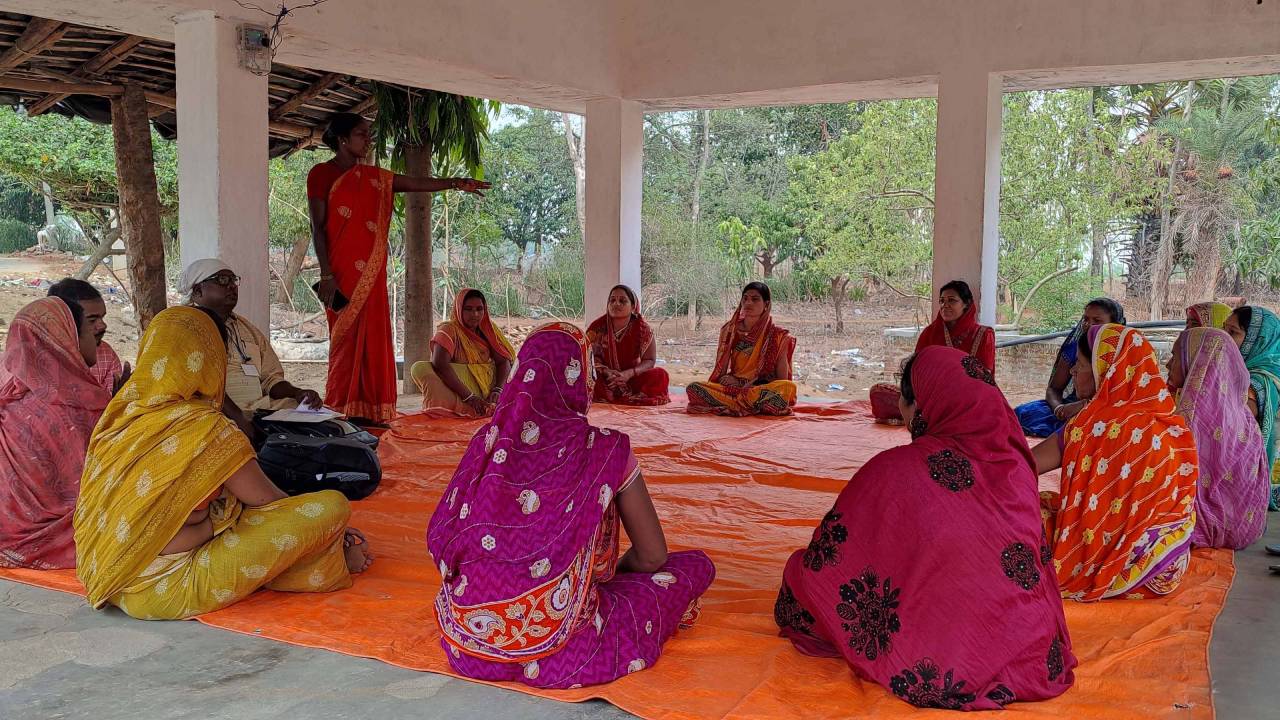Muniya’s Good START
by Saroj Kumar, Banka, Bihar
- Home
- Stories From The Ground
- Muniya’s Good START by Saroj Kumar, Banka, Bihar
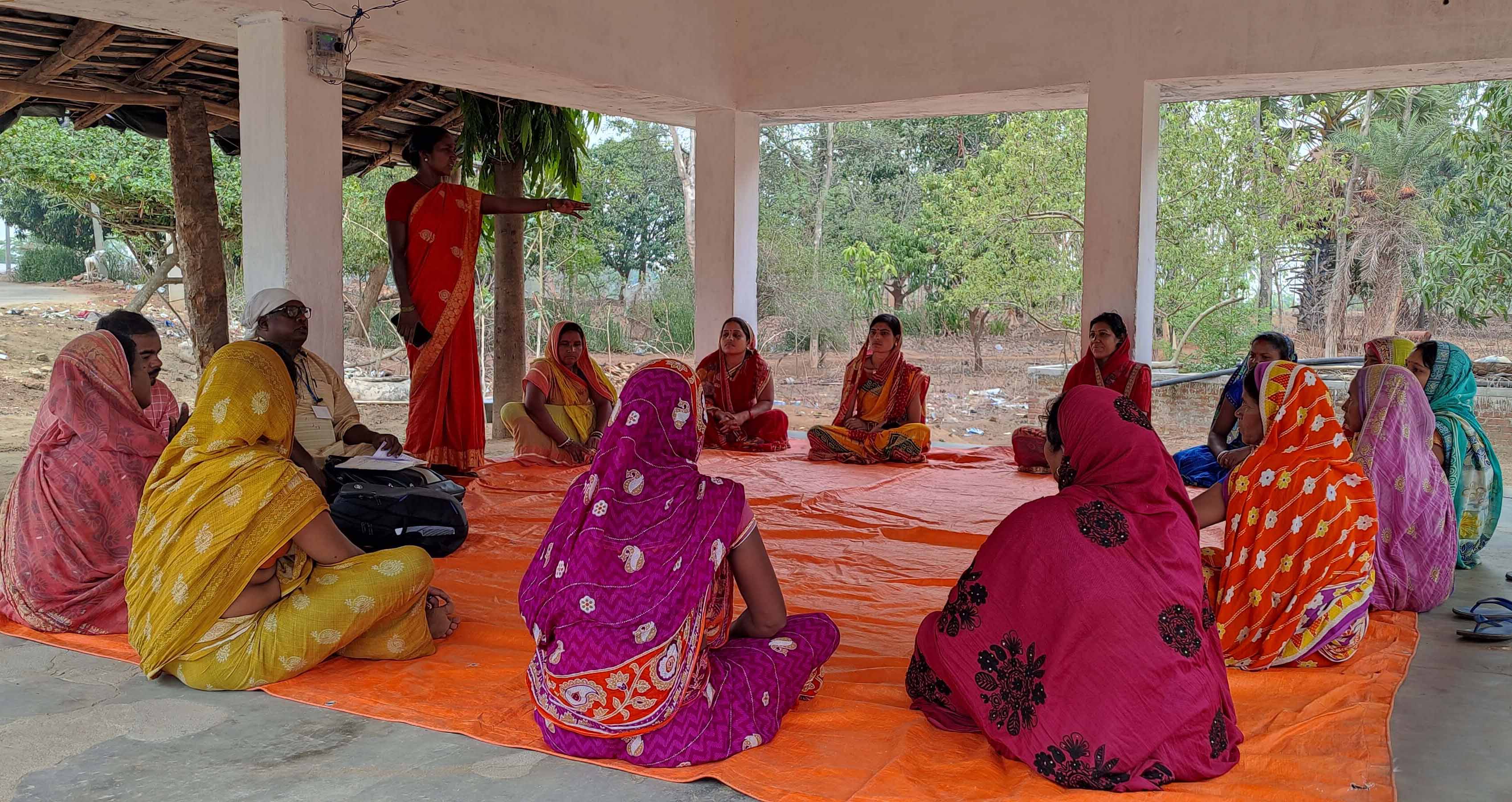 Muniya Murmu addressing a group of farmers in a meeting
Muniya Murmu addressing a group of farmers in a meeting
Before the cocks crowed, and the first light of dawn could paint the mid-December sky pale-blue, Muniya Murmu would open the bamboo-door of her home for her spouse Ramesh Kisku to step out. He would be leaving for destinations far of. Kolkata or Mumbai, to work in the construction sites. Life of a migrant labour in far-away cities involves extreme hardships and difficulties. But, the oldies, the women and the children who stay back at small hamlets in remote rural areas, don’t have a very smooth life either. Muniya Murmu from Inarawaran village is one of them who stay back. Like almost any other woman from the Santhal communities of Katoria block in Banka district of southern Bihar, she had to deal with barren lands, money lenders, uncertainties of crops and what not? “Pehle paisa kamane ke lie ghar ke dada-log bahar chale jate the, aur yahan ki saari jimmedari hum mahilaon par aa jati thi” (the men-folk from our households used to migrate to far-away cities in search of better incomes. The responsibilities of managing each and every aspect of our lives and livelihoods here we on left for us – the women), recollects Muniya.
A family of eight surviving on around 1.1 acres of land, some cultivable, some barren, and a meagre income sent by her spouse was not enough to sustain them. With Ramesh out of sight, continuous debts and a monthly earning of only Rs. 3,000/- Muniya had to constantly face questions about food and hunger from her children. It seemed, with time, her ability to dream of ending the endless-hunger and creating income opportunities at her own doorstep almost waned.
Challenges all around!
Many families of Inarawaran like Muniya’s were dependent on agriculture, Tasar-silk rearing, livestock rearing, and alike, for self-sustenance. While Tasar silk-worms and the cocoons added some relief to their ongoing financial struggles, Muniya says, they hardly knew the techniques to grow different varieties of vegetables which always had high prices in the markets. Nor did they know where to get good seeds and fertilisers to grow these crops. Even if I grow tomatoes or cauliflowers, selling them at the local Sunday haats, on the open field next to Inarawaran village will bring some cash in hands, but she will never be able to sell the entire produce there! But, if somehow her harvests could be sold at the Katoria market or in Deoghar, then selling the entire harvest will not be a problem! But, how? Muniya never had an answer to this small question. Above all, with Ramesh not there beside her, will Muniya be able to manage everything that’s required to grow those vegetables on her own? Wrinkles became deeper on her forehead, but answers were not to be found anywhere.
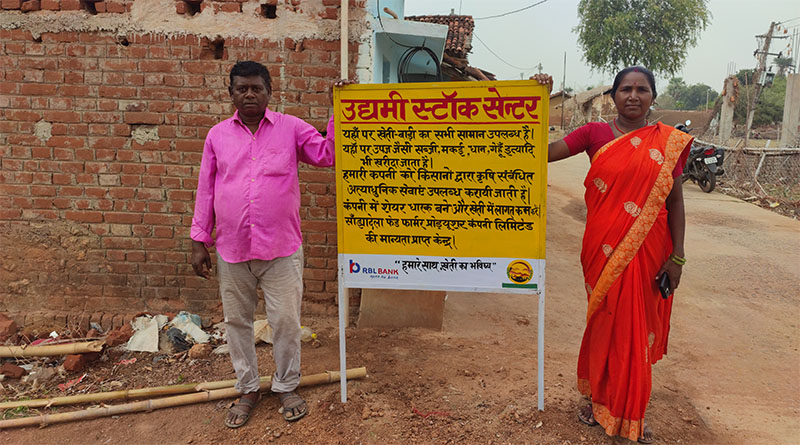 Ramesh and Muniya in front of a sign-board of their stock-centre
Ramesh and Muniya in front of a sign-board of their stock-centre
START of good times!
Short height, generous smile, and sure-footed Muniya was torn apart deep inside – not only for her own family but hunger of the entire village was troubling her to no end.
Things took a positive turn with the START (Stimulating Tribal And Rural Transformation) project supported by RBL Bank getting initiated in her village. Despite several doubts in the mind of the villagers, Muniya came forward and decided to become a Village Trainer, a position where she could train and support the fellow village members with the learnings she will be receiving under the project. She also decided to become an Agricultural Entrepreneur to support the farmers, by providing them with better quality of seeds as well as substantiate her own income.
Muniya participated in various trainings on improved agricultural practices by the professionals of PRADAN under the START project. She further trained the villagers. Things started to change for her! And through her, for the other villagers as well.
Farmers were brought together as a collective; Muniya Murmu convinced the ones still in doubts to be a part of a group and finally, an FPO (Farmer Producer Organisation), ‘Sanjhadela Fed Farmer Producer Company Limited’ was established in April, 2021. Today, this FPO boasts a membership of 1800 shareholders. Muniya with other members of the FPO have started planning and mapping out the requirements of the upcoming agricultural season beforehand. The process of input linkages (availability of seeds, pest management, etc.), following up with PoP (Package of Practices) after sowing of seeds and providing market linkages, every small and big component of farming was decided before to get the best out of their cultivation. This end-to-end support in their parlance is called ‘beej se bazaar tak’ (from seeds to market)!
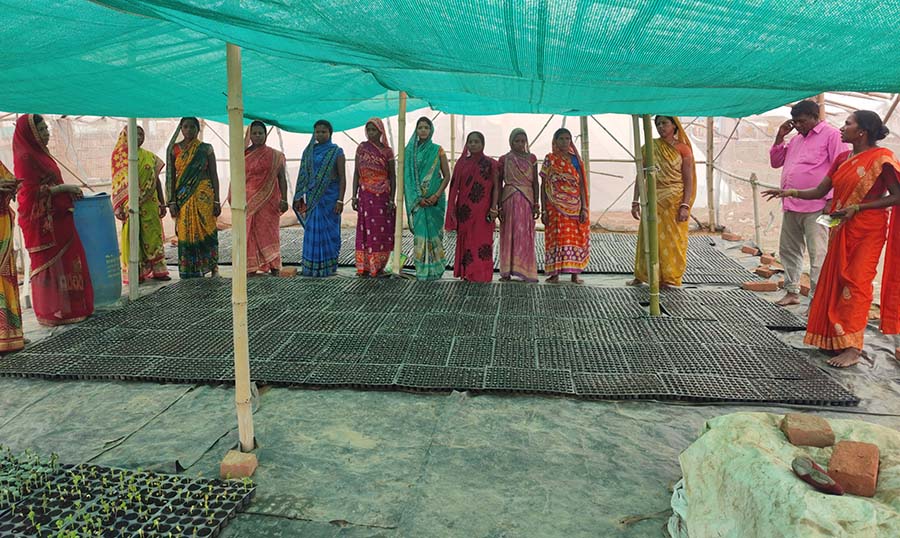 Muniya explaining how saplings are grown in her nursery to other farmers
Muniya explaining how saplings are grown in her nursery to other farmers
Muniya’s entrepreneurship changed Ramesh’s life – and many other lives as well!
While working with the FPO, Muniya re-discovered the problems of her neighboring farmers. The block town of Katoria lies 25 kms away, and the farmers were required to travel there to procure seeds which increased the cost of production dramatically.
Determined to solve this problem, she started a net-house nursery on her barren land and started providing high-quality, soil-less seedlings of brinjal, cabbage, cauliflower, chilli, tomato and creepers (bitter-gourd, cucumber, watermelon, bottle gourd) to the villagers, thus saving them the time, money and effort to go to the town to procure them. Ramesh joined hands with her.
Now an entrepreneur, she has invested INR 70,000 in the net-house nursery and earned a total income of INR 200,000 till now, making a profit of INR 130,000 in the Kharif and Rabi seasons spanning nine months. Muniya Murmu has been able to support around 300 farmers across seven villages namely, Inarawaran, Lilabaran, Majhiyana, Gehda, Aasanbani, Lilathan, Rupdesar of Katiyari Panchayat by establishing seed and medicine linkage apart from providing training and handholding support to women farmers in the year 2022-23. Ramesh had never imagined that the homestead, now converted into their nursery could help him earn them a profit of INR 130,000! Muniya made this possible.
With the help of the PG and the FPO, the barren lands are also being used for farming. Landless women came together as a collective, were provided access to these lands, and necessary support and training by the FPO, resulting in these lands becoming cultivable and farmers earning their livelihoods from them. All this is happening because Muniya’s long-cherished dream of selling the harvests in the far away markets in Katoria and Deoghar is a reality today for Inarawaran-Lilabaran farmers. No crop is wasted, no farmer sells their crops under distress, anymore.
The youth of the village, earlier disinterested in agriculture, are now beginning to get interested as they see the prospects of income and profits from agriculture. Mukesh Kisku, Muniya’s son, inspired by his mother’s success, has started supporting her in farming.
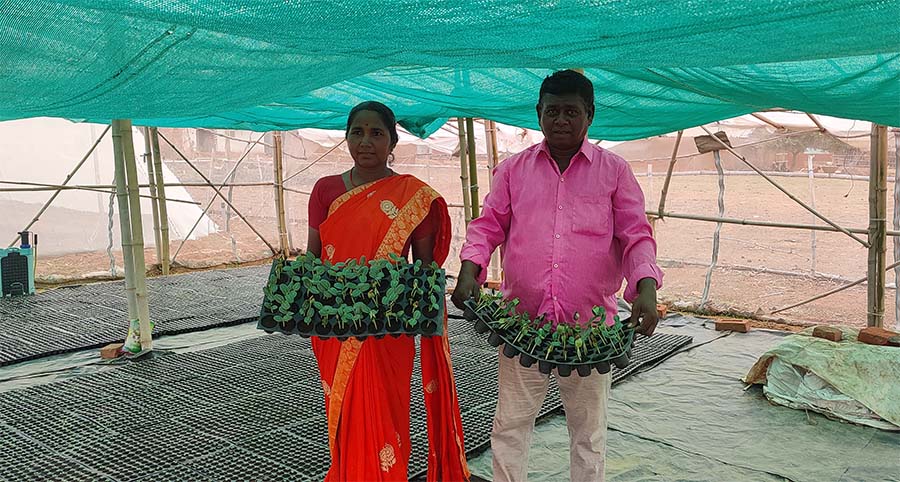 Muniya and Ramesh showing saplings that germinated in their nursery
Muniya and Ramesh showing saplings that germinated in their nursery
A good START!
“Ab koi bahar nai jata, pura pariwar mil kar kheti karta hai, achhe paise mil jate hain. Ramesh ko hi dekh lo!'' (These days the entire family cultivates the land together. We are able to earn a good amount of money from it. Ramesh himself is a glaring example), says Muniya beaming with confidence and happiness.
“Ab main bhi yahan hun, milkar kheti kar raha hun to amdani aur badhegi. Ek lakh tees to bas shuruwat hai, Muniya aur main isi net-nursery se teen lakh kamake dikhayenge!” (Now I am also here to support Muniya in agriculture and am sure we will increase our income. INR 130,000 is just a good start, I am sure we will make INR 300,000 from this net-nursery), claims a confident Ramesh.


